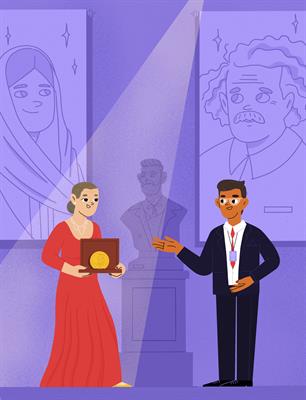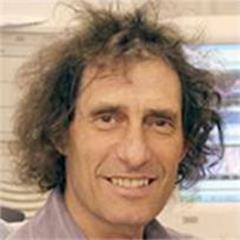
The Nobel collection, Volume 2
Collection Editors
Idan Segev, Robert KnightViews
898,469 viewsParticipating Sections
Submission Deadline
Closed
Articles

Neuroscience and Psychology
31/05/2023
Place Cells: The Brain Cells That Help us...
Authors
John O’Keefe
Human Health
31/05/2023
Turning RNA Into DNA: The Discovery That...
Authors
David Baltimore
Human Health
31/05/2023
RNA Splicing—Cutting and Pasting Genes
Authors
Phillip A. Sharp
Astronomy and Physics
31/05/2023
How to Catch an Atom: Tales on Time-Telling and...
Authors
Noa Segev, David Wineland
Mathematics and Economics
31/05/2023
The Economy: Much More Than Money
Authors
Angus Deaton
Chemistry and Materials
31/01/2023
Resolution Revolution—Seeing the Molecules of...
Authors
Noa Segev, Richard Henderson
Human Health
31/01/2023
Telomere Power: How to Live Longer and Healthier
Authors
Elizabeth Blackburn
Astronomy and Physics
31/01/2023
Defying Gravity? On the Magic Tricks of...
Authors
Michael Kosterlitz
Astronomy and Physics
31/01/2023
Neutrinos: The Ghost Particles That Make Up Our...
Authors
Art McDonald
Neuroscience and Psychology
31/01/2023
The Olfactory System: It Smells Good To Be Alive
Authors
Richard AxelAbout this collection
The e-book was translated into Hebrew which you can download here.This second Volume of our unique Nobel Collection brings you more articles by Nobel Prize winners (called Laureates), written specifically for young minds. These amazing research leaders explain their ground-breaking discoveries and how they achieved them, and also share their thoughts on making a career path in science with advice for becoming a successful researcher and having a happy life. Like everything Frontiers for Young Minds publishes, these articles have been reviewed and approved by kids like you!
What are the Nobel Prizes?
Humans are highly curious – we are eager to understand ourselves and the world around us. A scientific understanding is critical for finding solutions to all our global challenges, from diseases like Covid to climate change. Scientists and researchers devote their lives to exploring and understanding the laws of nature and life itself.
Every researcher’s results contribute to our body of human knowledge. Occasionally, new discoveries totally transform the way we understand the universe and ourselves - for example, Albert Einstein’s famous break-throughs in theoretical physics, or the pioneering work of Marie Skłodowska Curie, which led to the discovery of new elements and advanced treatments using X-rays and curing cancer. Each year, these transformative discoveries are celebrated with Nobel Prizes, founded by Alfred Nobel in his will and awarded since 1901, to represent the highest level of recognition for research. In our journal we feature the winners of prizes in Chemistry, Physics, Physiology or Medicine and Economics.
Did you know that you, as a Young Minds reader, share an important trait with our Nobel Prize winners? This is curiosity. The scientific journeys of Nobel laureates are fueled by an intense, life-long search for answers – the same curiosity that motivates you to read these articles.
As Nobel Laureate May-Britt Moser told us: “As a scientist, I feel privileged to be able to ask questions that I think are important. I hope the papers in this journal may help nurture and reinforce children’s passion and curiosity for science – what a gift to humanity that would be!”
Let this unique Collection help you to develop your own curiosity and passion, and inspire you reach for new discoveries in your own life!
Check out the 10 brilliant articles in Volume 1 here – find out about key discoveries ranging from how humans find our way using special brain cells, to how we might find life on planets beyond our solar system!
Would you like to submit to this collection?
For researchers interested in submitting to this Collection, please consult our author guidelines and check that you have all the essentials included before submitting

















